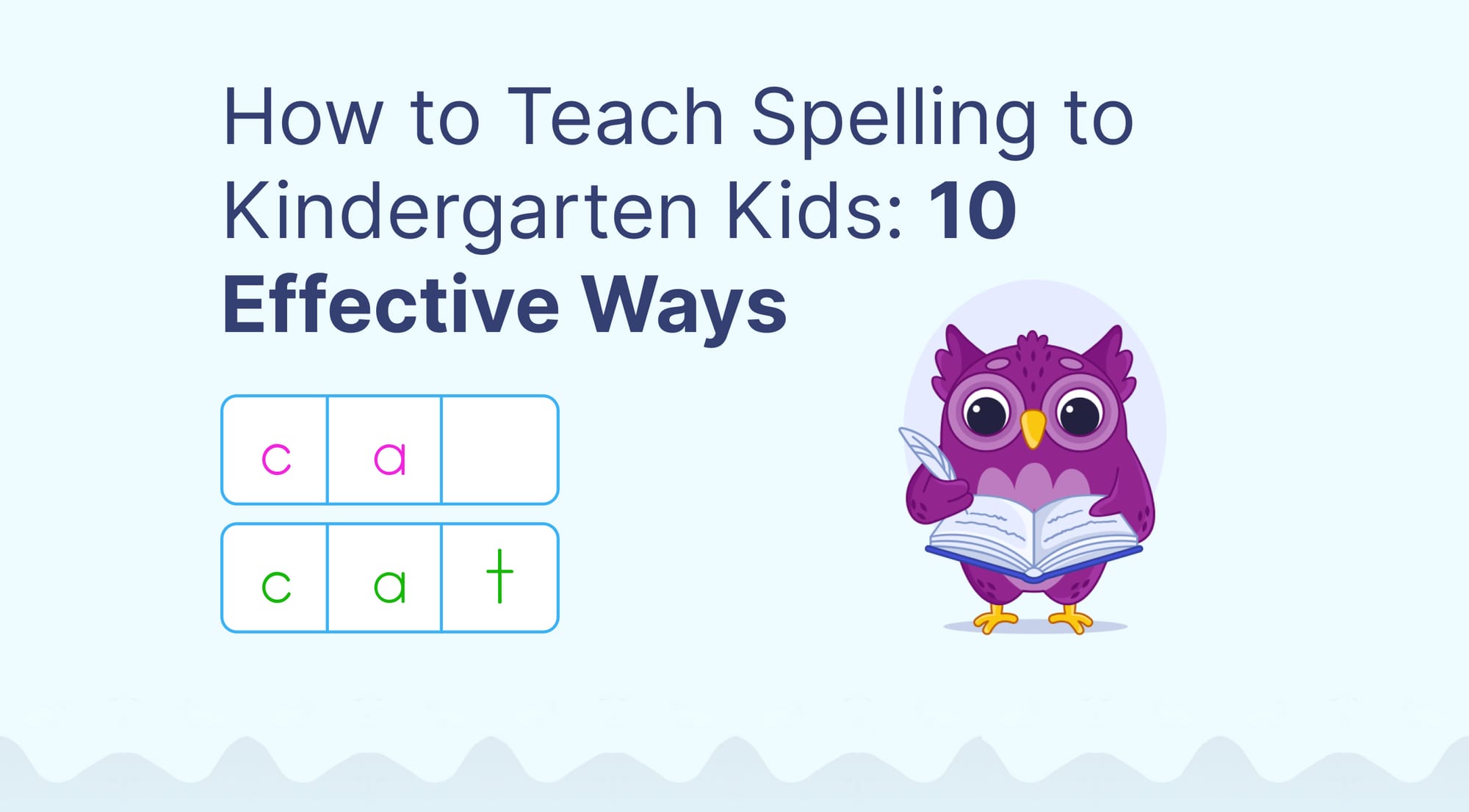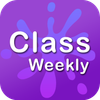How to Teach Spelling to Kindergarten Kids: 10 Effective Ways
Discover 10 effective strategies for teaching spelling to kindergarten kids. From engaging games to interactive exercises, unlock the key to spelling success and foster a love for language at an early age.
As kindergarten teachers, we know that building a strong foundation in spelling is key in our students' academic journey. Spelling and handwriting skills not only make writing more effective, but also greatly boost their reading abilities.
Here are 10 effective spelling techniques that will make teaching your kindergarteners fun and engaging.
- Phonics-based Spelling
- Word Families and Patterns
- Hands-on Spelling Activities
- Spelling Worksheets
- Word Chains
- Flash Cards
- Word Games
- Finding Words in Books
- Interactive Spelling Games
- Get Parents Involved
Read on to learn how to make your little ones spelling scholars!

Phonics-based Spelling
At the heart of teaching spelling to kids, lies a solid understanding of phonics. At this point, our little ones know their ABCs, and most also know how each letter sounds.
This is the perfect time to sharpen these skills. When laying the foundation, it's important to keep things simple first. Try these classroom activities:
- During group time, assign a letter to each student and have them sound out their assigned letter. Start with the letter A and continue through the alphabet.
- Sound out small, three-letter CVC words (consonant-vowel-consonant). Speak slowly and have the children repeat with you.
- Spice things up with fun phonics songs that incorporate dictation exercises for spelling while singing.
Once your little ones get the hang of sounding out the alphabet letters and recognizing them by their sounds, spelling will feel like a breeze for them!
Word Families and Patterns
Teaching word families and common spelling patterns helps kids recognize predictable word structures. Start with simple CVC (consonant-vowel-consonant) patterns like "-at" or "-in" words. As your little ones grasp this concept, you can gradually add more complex patterns. Try these spelling activities:
- Create a whiteboard or printout of the most common word families. Add to it as the kids learn new words and patterns.
- Use flashcards featuring words belonging to specific word families. Then, ask your kiddos to identify and match these words to the corresponding word family they belong to. This is a wonderful activity for helping kids learn to recognize patterns in words.
There are 37 common word families. Teaching these early will greatly improve your kindergarteners' ability to read and sound out words, as well as spell with ease. 😊
Hands-on Spelling Activities
Get those little hands busy with spelling activities that involve both their minds and hands. Creative spelling practice increases repetition which boosts memorization.
- Have students build words using magnetic letters
- Create spelling flipbooks
- Form letters using playdough
- Make fun phonic charts - let your kiddos color them, and hang them on the wall.
- Create poster-sized missing-letter words. During study time, students can take turns filling in the blanks.
Your kindergarteners are sure to love these hands-on activities (!) which make spelling practice fun, develop fine motor skills, and reinforce letter shapes.
Spelling Worksheets
Spelling worksheets play an important role in teaching our kids how to spell. Through these worksheets, they can visualize the letters composing the words as they match them to corresponding pictures. Writing the words over and over helps them memorize the correct spelling. Best of all, worksheets are great for independent study time, and are a great tool parents can use at home!
Over time, children learn to sound out words and spell them; for now, our job is to help them become familiar with the sounds and letters and how they come together to form words. 🙌
Word Chains
Word chain activities are a fun and easy way to show kindergartners how words can be made by changing only one letter, such as “cat" to "bat” or “bed" to "red.” These awesome tools can be used in the classroom to make word chains fun:
- Magnetic letters and a whiteboard - Create a "start" word, and let your kids use the magnetic letters to create a new word by changing only one letter.
- Worksheets - Kids love word chain worksheets because it feels like they're playing a game.
- Construction paper rings - cut out strips of colored construction paper and write one letter of each word from your word list. The kids will then put the letters in order as you read out each word. Last but not least, ask your kids to make a paper chain out of each word. This is a fun activity that is sure to get your little ones excited! Here is a wonderful example of paper-ring chain words.
Chain words make it easy to see how simple it is to change a word with just one letter. They also help children discover a new approach to learning how to spell words by matching them with similar-sounding words.
Flash Cards
You have likely already noticed flashcards appearing in practically every subject you teach your kindergartners. Flashcards are easy to make and use, and visual tools like these help children stay engaged in what you are teaching.
Create spelling flashcards with words and corresponding images. For example, one card could say “d—o—g,” while another features a picture of a dog. You can utilize these flashcards in group settings for matching games or provide each child with a set for independent play. As your students gain confidence, you can also use flashcards for spelling bee preparation, and even organize a contest for kindergartners.
Word Games
Who says spelling practice has to be boring? Turn it into a spelling game! Participation games keep children engaged while they learn. Add some simple prizes and make it a friendly competition. You can play games like:
- Spelling Bingo
- Spelling Scavenger Hunt
- Hangman
- Word Puzzles - you can use word puzzle worksheets, Scrabble tiles, or magnetic letters. Scramble common words and see how fast students can unscramble them.
Quick tip: for a bit of extra help, create memory aids for spelling with word cards. You can use the Dolch or Fry sight word lists for this.
Playing games helps distract your little ones from the fact that they are learning and allows them to focus on simply having fun. 💕
Finding Words in Books
Spelling and reading go hand in hand, so why not combine them? I’m sure you have lots of kindergarten books in your classroom. Have students take turns reading one sentence out loud. Point out spelling patterns and help them sound out any words they're unsure about. Spelling aloud improves how our kids associate letters with spelling.
Finding words in books helps our kindergarteners connect writing, spelling, and reading. You can create custom workbooks and assign one to each student. These workbooks contain activities that are designed for kids to match the words they are reading to images or find spelling patterns. Having workbooks also makes it easy to send spelling work home.
Interactive Spelling Games
It's highly likely that there is at least one tablet or smartphone in your students' homes. Utilize the power of the Internet both in class and at home by using websites and apps that teach spelling.
Spelling training is a free website offering practice exercises and games that your students can use independently. You can also find many other word games for spelling here, including:
- Sky Spelling: Students navigate an obstacle course while learning to spell.
- Hopper: This fast paced game has your students guiding a frog to spell words and collect gems.
- Putt Putt Spelling Golf: Who doesn’t love Putt Putt? This spelling game simulates a mini-golf course while students practice their spelling words.
Another BIG advantage is that these online spelling games utilize a keyboard, which incorporates typing practice into spelling practice as well. Essentially, students are learning two skills at once. Typing a word helps your fingers remember the spelling, turning it into a series of keystrokes. This can be especially helpful for students who find language-based learning challenging.
Get Parent Involved
Partner with parents to extend learning beyond the classroom. Send home spelling practice materials or suggest fun family word games. Keep parents informed about their child's progress and areas for improvement. Children receive consistent reinforcement and support in their spelling journey when families are involved.
Student Progress
Make sure to monitor your students' progress through t-e-s.. wait! Let's use the word "challenge." Yes, that's better 😊 And less intimidating. You can assign a list of words at the beginning of the week, and use them in a "weekly challenge" on Friday. Why? Few reasons:
- You get a better idea of how your teaching methods are working.
- You can identify which students need more help.
- Students can see for themselves whether they are succeeding or if they need extra help.
Remember this when testing your students: those who need extra help may sometimes feel discouraged. Make sure these students receive additional support (and motivation). Guide them towards achieving small victories.
Conclusion
Teaching spelling in kindergarten is an exciting challenge that lays the groundwork for future literacy success.
Remember, every child learns differently, so don't be afraid to mix and match these techniques to find what works best for your students. Wishing you and your little spellers a fun journey exploring the world of words together!

